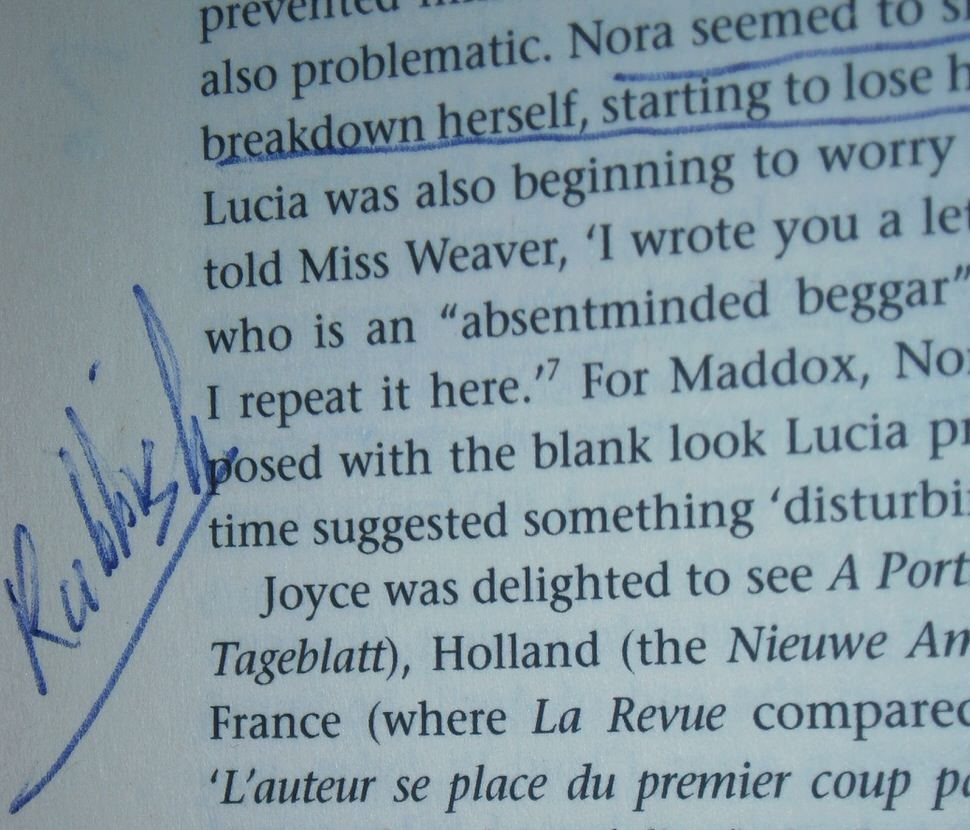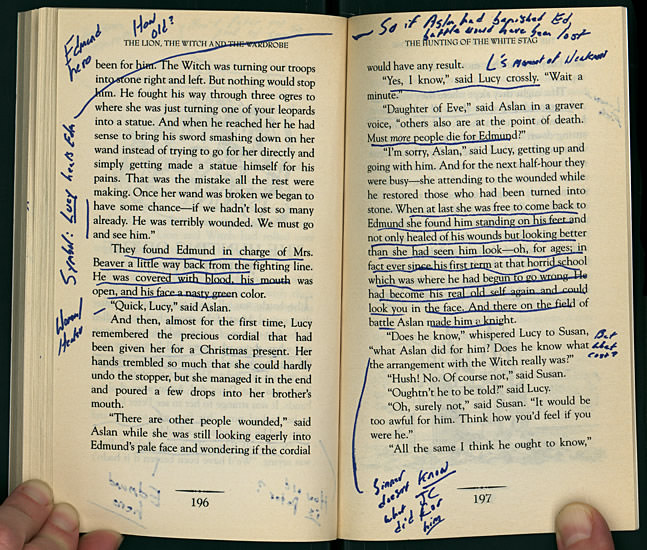Imagine you are asked what single alteration in people’s behavior might best improve the lot of mankind. How foolish would you have to be to reply: have them learn to read with a pen in their hands? But I firmly believe such a simple development would bring huge benefits.
We have too much respect for the printed word, too little awareness of the power words hold over us. We allow worlds to be conjured up for us with very little concern for the implications. We overlook glaring incongruities. We are suckers for alliteration, assonance, and rhythm. We rejoice over stories, whether fiction or “documentary,” whose outcomes are flagrantly manipulative, self-serving, or both. Usually both. If a piece of writing manifests the stigmata of literature—symbols, metaphors, unreliable narrators, multiple points of view, structural ambiguities—we afford it unlimited credit. With occasional exceptions, the only “criticism” brought to such writing is the kind that seeks to elaborate its brilliance, its cleverness, its creativity. What surprised me most when I first began publishing fiction myself was how much at every level a novelist can get away with.
This extravagant regard, which seemed to reach a peak in the second half of the twentieth century as the modernists of a generation before were canonized as performers of the ever more arduous miracle of conferring a little meaning on life, is reflected in the treatment of the book itself. The spine must not be bent back and broken, the pages must not be marked with dog ears, there must be no underlining, no writing in the margins. Obviously, for those of us brought up on library books and school-owned textbooks (my copy of Browning bore the name of a dozen pupils who had used the text before me), there were simple and sensible reasons supporting this behavior. But the reverence went beyond a proper respect for those who would be reading the pages after you. Even when I bought a book myself, if my parents caught me breaking its spine so that it would lay open on the desk, they were shocked. Writing was sacred. In the beginning was the Word. The word written down, hopefully on quality paper. Much of the resistance to e-books, notably from the literati, has to do with a loss of this sense of sacredness, of a vulnerable paper vessel that can thrive on our protective devotion.

The absolute need to read with a pen in one’s hand became evident to me watching my students as we studied translation together. I would give them the same text in English and Italian and ask them to tell me which was the original text. Or I would give them a text without saying whether it was a translation or not and ask them to comment on it. Again and again, the authority conveyed by the printed word and an aura of literariness, or the excitement of dramatic action, or the persuasive drift of an argument, would prevent them from noticing the most obvious absurdities. They would read a sentence like “For a little while in his arms Maria was like a doll, she allowed herself to be undressed and turned in the bed without taking a breath” (from William Weaver’s translation of Rosetta Loy’s Le strade di polvere) and be so captivated by the romantic context as to miss the fact that one cannot be undressed and turned in a bed without taking a breath; it takes rather longer to undress someone and have your way with them than most people can survive without breathing. This is a poor translation of an Italian mix of idiom and invention—senza emettere un fiato—which might best have been translated “without so much as a sigh.”
Or they would read, “Then came the train. It began by looking like a horse, a horse with its cart raised up on the rough stones” (from Isabel Quigley’s translation of Pavese’s The Moon and the Bonfires), and amid the drama of the action they wouldn’t see how incongruous this image of a cart “raised up on rough stones” was, how unlikely it would be to raise up a cart on rough stones. It was just a poor translation of a horse and cart on cobbles (un cavallo col carretto su dei ciottoli).
But beyond these small technicalities, the kind of internal inconsistencies that someone like Beckett introduced into his work to wake the reader up (and again many students do not notice such deliberate inconsistencies), I would find that we had read a page of Virginia Woolf together without the students realizing that we were being encouraged to think positively about suicide, or we would read Lawrence without their being aware that the writer was insisting that some lives were definitely worth more than others. I even remember a class reading this passage from Henry Green (admittedly as part of a larger scene) without any student being aware of its sexual content:
Advertisement
But in spite of Mrs Middleton’s appeal, the girl, with a “here you are” leant over to the husband and opened wide the pearly gates. Her wet teeth were long and sharp, of an almost transparent whiteness. The tongue was pointed also and lay curled to a red tip against her lower jaw, to which the gums were a sterile pink. Way back behind, cavernous, in a deeper red, her uvula seemed to shrink from him.

Aside from simply insisting, as I already had for years, that they be more alert, I began to wonder what was the most practical way I could lead my students to a greater attentiveness, teach them to protect themselves from all those underlying messages that can shift one’s attitude without one’s being aware of it? I began to think about the way I read myself, about the activity of reading, what you put into it rather than what was simply on the page. Try this experiment, I eventually told them: from now on always read with a pen in your hands, not beside you on the table, but actually in your hand, ready, armed. And always make three or four comments on every page, at least one critical, even aggressive. Put a question mark by everything you find suspect. Underline anything you really appreciate. Feel free to write “splendid,” but also, “I don’t believe a word of it.” And even “bullshit.”
A pen is not a magic wand. The critical faculty is not conjured from nothing. But it was remarkable how many students improved their performance with this simple stratagem. There is something predatory, cruel even, about a pen suspended over a text. Like a hawk over a field, it is on the lookout for something vulnerable. Then it is a pleasure to swoop and skewer the victim with the nib’s sharp point. The mere fact of holding the hand poised for action changes our attitude to the text. We are no longer passive consumers of a monologue but active participants in a dialogue. Students would report that their reading slowed down when they had a pen in their hand, but at the same time the text became more dense, more interesting, if only because a certain pleasure could now be taken in their own response to the writing when they didn’t feel it was up to scratch, or worthy only of being scratched.
Looking back over the pages we have already read and marked, or coming back to the novel months, maybe years later, we get a strong sense of our own position in relation to the writer’s position. Where he said this kind of thing, I responded with that, where he touched this nerve, my knee jerked thus. Hence a vehicle for self knowledge is created, for what is the self if not the position one habitually assumes in relation to other selves? These days, going back to reading the books that have remained since university days, I see three or four layers of comments, perhaps in different colored pens. And I sense how my position has changed, how I have changed.

In this regard, you might say that the opportunity to comment on articles published online is an excellent thing. And it is. I do not share the view of some fellow writers that those commenting, criticizing, and protesting are beyond the pale. Often I will find comments below an article (on occasion, alas, below my own articles) that are more intelligent, even better informed, than the article itself. This is exciting, even when it is mortifying.
Nevertheless, commenting on articles online is not the same thing as writing in the margins of the novels one has bought. Online one is expressing one’s opinion for other readers. There is a risk of falling back on partisan positions, of using the space to ride old hobby horses, of showing off. Often the debate moves far away from the article itself. And once the comments are made it is unlikely one will go back to look at them, certainly not in the way one is more or less bound to go back, over the years, to Hemingway or Svevo, or Katherine Mansfield, or Elsa Morante; and then it is fascinating to see what you did and didn’t see in the past. You criticized an opinion that makes perfect sense now; you applauded a detail that now looks suspiciously fake. What will I feel about today’s comments on my next reading?
Advertisement
Some readers will fear that the pen-in-hand approach denies us those wonderful moments when we fall under a writer’s spell, the moments when we succumb to a style, and are happy to succumb to it, when suddenly it seems to us that this approach to the world, be it Proust’s or Woolf’s or Beckett’s or Bernhard’s, is really, at least for the moment, the only approach we are interested in, moments that are no doubt among the most exciting in our reading experience.
No, I wouldn’t want to miss out on that. But if writers are to entice us into their vision, let us make them work for it. Let us resist enchantment for a while, or at least for long enough to have some idea of what we are being drawn into. For the mindless, passive acceptance of other people’s representations of the world can only enchain us and hamper our personal growth, hamper the possibility of positive action. Sometimes it seems the whole of society languishes in the stupor of the fictions it has swallowed. Wasn’t this what Cervantes was complaining about when he began Don Quixote? Better to read a poor book with alert resistance, than devour a good one in mindless adoration.



